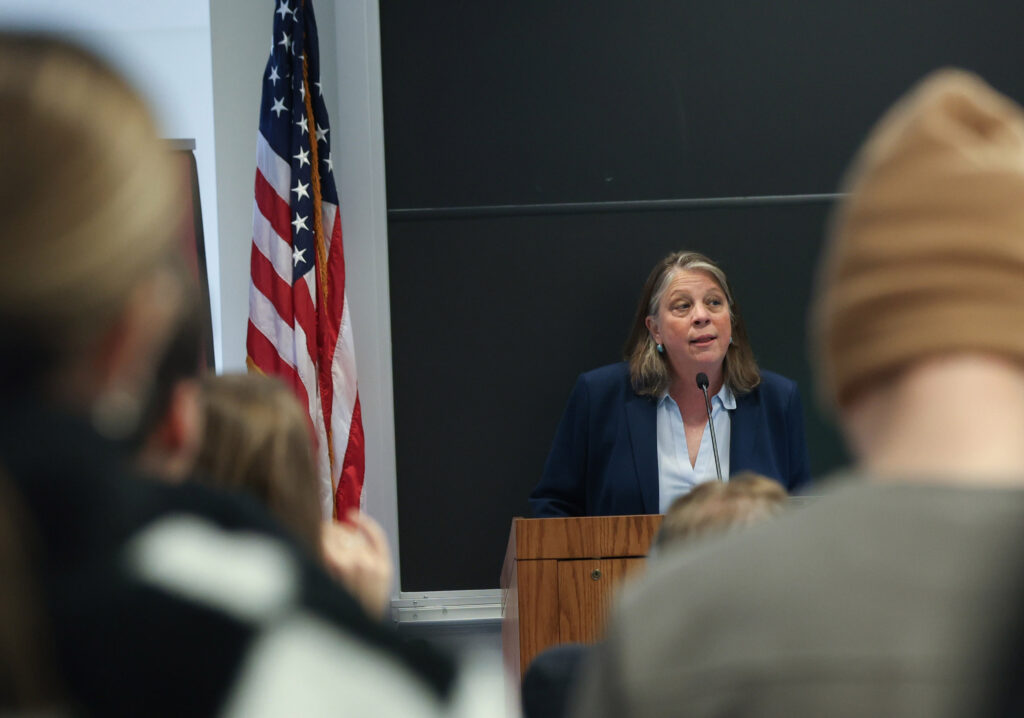Over the course of three days at BC Law in October, the ACLU’s Carol Rose participated in several events not only on the power of activism and community-building, but also, crucially, on the defense of civil rights and civil liberties.
She came as a Senior Fellow of the Rappaport Center for Law and Public Policy. The centerpiece of her stay was moderating a panel entitled “Responding to the Executive Branch’s Targeted Enforcement: How Lawyers Protect Civil Rights.”
As Executive Director of the ACLU of Massachusetts, Rose has long used litigation, legislation, communication, and organizing to defend civil rights and civil liberties. She opened the conversation by posing two questions to the panelists: Can the executive branch target political enemies by using the Department of Justice? And what does it mean for a constitutional republic when the Department of Justice is used in this way?
Panelist Jessie Rossman, legal director of the ACLU of Massachusetts, answered candidly: “Whether they can do it or not, they are. But the administration doesn’t get to decide what the law is, it’s up to all of us to push back.” She stressed the role of lawyers, media, and civil society in calling out such behavior as abnormal and refusing to let it become the new norm.
Naomi Shatz, a partner at Zalkind Duncan & Bernstein LLP, added that while mechanisms exist to challenge political prosecutions, they still require the people being targeted to undergo a lengthy, expensive prosecution or, in the immigration context, detention. She cautioned that while it is unlikely these people are going to be found guilty of crimes, these prosecutions nonetheless have the impact of “showing other people that if you are adverse to the president or the administration, you may be put through this multi-year criminal process.”
The third panelist, David Zimmer, a founding partner at Zimmer, Citron & Clarke LLP, reflected on how much of American governance “depends on norms, not the Constitution.” He described recent moments when the administration fired or threatened to fire prosecutors who refused the President’s order to drop or indict cases: “You’re going to start to see even more is going to turn on how much people are willing to stand up and say that there are principles that may not be judicially enforceable in the Constitution but are things that are needed in order for the country to work.”
Shatz turned her attention to schools and universities, noting a chilling pattern in response to pressure from the Trump Administration, especially regarding pro-Palestine protests. Institutions, afraid of having federal funding withheld, are turning around and cracking down on specific areas on their campuses preemptively to comply or be in alignment with the Administration.
Zimmer discussed the Administration’s exerting similar pressure on large law firms, some of which, like universities, also complied preemptively, striking deals with the President. He emphasized that while big firms make billions of dollars, they can nonetheless be vulnerable in that they fear losing lawyers or clients if they are penalized by the Administration for representing certain clients. Ultimately, the firms that did not panic or precomply have actually done better as a result of their principled responses. That said, Zimmer observed that many mainstream advocacy or client-service organizations, particularly those organizing around immigration, can’t get big firms to represent them anymore.
The panel noted that the Administration targeted not just universities or law firms, but also individuals, punishing students for expressing points of view that it didn’t like. Rossman shared how she was one of the lead attorneys on the ACLU’s representation of Rümeysa Öztürk, a Tufts PhD student taken by masked ICE agents off the streets of Somerville for co-authoring an op-ed urging her university to recognize that a genocide was happening in Palestine. She was held for 45 days at an immigration detention center in Louisiana.
Zimmer reminded the audience why constitutional protections must extend to everyone, regardless of citizenship. If non-citizens fear speaking up, reporting crimes, or even calling the police, it can have a negative effect on society. “For core constitutional rights, I think it’s really dangerous for our whole society if we don’t protect those,” he said.
In response to audience questions about how students can cultivate the judgment and skills to uphold the rule of law and push back on executive overreach, the panel urged students to nurture relationships with their peers. “Surround yourself, professionally and personally, by people that you trust and admire,” urged Zimmer. Rossman, quoting Professor Lani Guinier, similarly emphasized the importance of having a “personal board of directors” who can hold you accountable. Shatz offered that it is important to find places that will support your taking risks to do the right thing, suggesting that small and medium firms can often offer more freedom.
“Upholding the rule of law is one of the most patriotic things that we can do as lawyers,” Rose said. “So I would just say, hold your head high and do this work righteously.”
The panel discussion was co-sponsored by the Public Interest Law Foundation and the American Constitutional Society.
Photograph by Reba Saldanha


